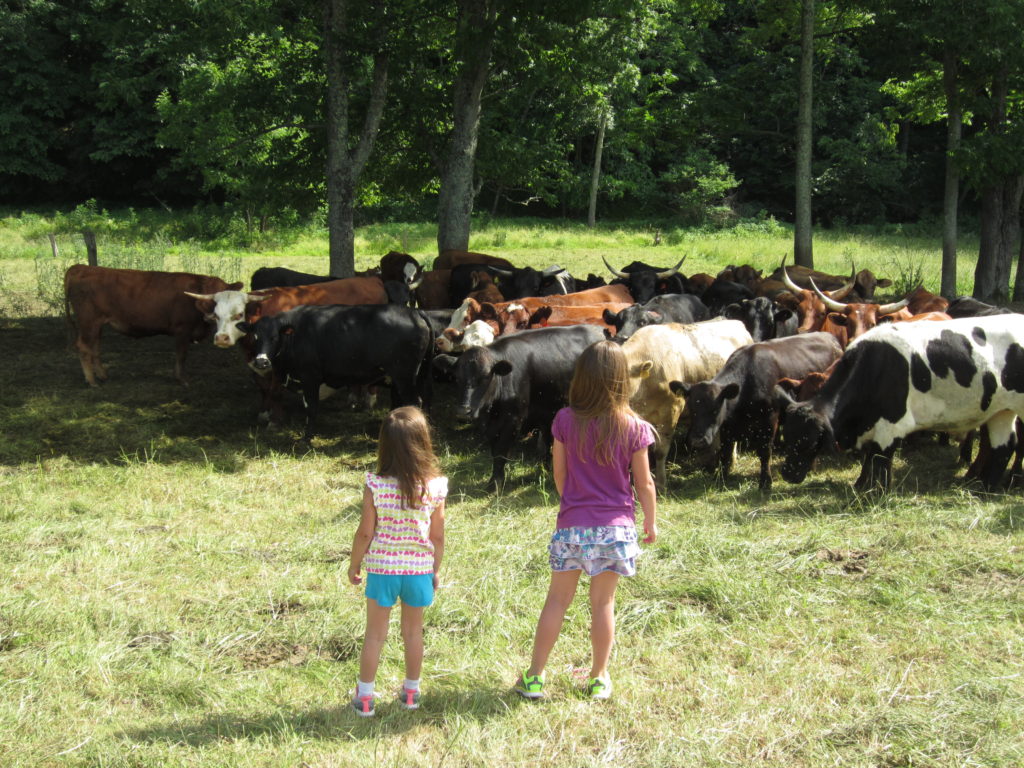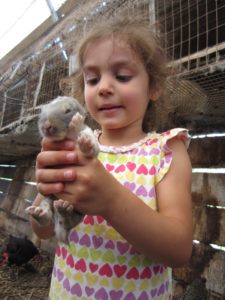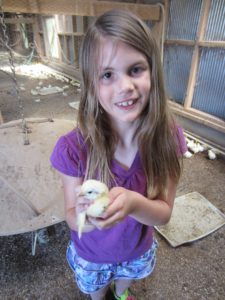The sun was slipping behind the hills, and the streets of town gave way to narrowing rural roads flanked by rolling pastures dotted with cows and new hay. As our family drove, the paved road turned to gravel and we crossed a wooden bridge, with the hills of Virginia’s Shenandoah Valley on the horizon.
We pulled up in front of the 18th century farmhouse where my family chose as our mini vacation destination, and multiple generations of relatives greeted us, along with half a dozen cats who sauntered out from behind the lilac bushes and tractors to rub against our legs. An open-sided barn holding stacked hay bales stood to one side, with portable chicken houses speckling a hill behind the farmhouse.
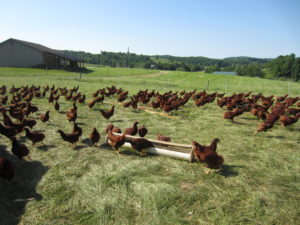
This is Polyface Farm. To people who are fans of natural farming and healthy food, Polyface is the home of farmer Joel Salatin, who has appeared in documentaries such as Food, Inc. and Farmageddon.
For me, Joel is family. He is my dad’s cousin. When I was growing up, family stories about Polyface Farm and various relatives’ visits there abounded. Most famous was the time when my parents, aunt, uncle, and I (aged 3) attempted to camp in the woods behind the farmhouse but couldn’t find our campsite one night in the dark and ended up sleeping in the farmhouse. There’s also the story about the time one of my cousins had trouble stomaching the sight of chickens destined for the dinner table meeting their demise.
I had not been at Polyface Farm since my teenage years, so when a family reunion on my husband’s side brought us to North Carolina last summer, we decided to drive a little farther north and make a stop at the farm in Virginia as well.
There are all kinds of national landmarks and historic sites we could have visited during our trip out east, such as Thomas Jefferson’s former home, Monticello; Washington D.C.; Richmond, Virginia; Colonial Williamsburg; Jamestown; and more. We did take a few hours to walk around at Appomattox Court House National Park, where the Civil War officially ended, but otherwise we decided to focus on spending time at Polyface Farm.
It was one of the most memorable trips our family has taken. As an amateur naturalist who feels a connection to Ma Ingalls and could have thrived on a farm in a different life, Polyface is a delight for me. What made it more special this time was watching my daughters as they held fluffy chicks, hunted for eggs, petted sheep and rabbits, picked mulberries, swung from rope swings in the garden, viewed bee hives, climbed in the hay in the barn, and got face-to-nose with a group of cows.
The farm turned out to be as enjoyable, memorable, and educational as any place. For my young daughters, it also was probably more age appropriate and appealing to kids than many of the historical sites in the region we could have visited.
What My Kids Learned on the Farm:
Food does not magically appear on grocery store shelves. It’s important for kids to learn where our food comes from. We watched a group of farm interns process chickens one morning. Processing is a polite way of saying that the chickens were killed, cleaned, and prepared for store shelves. We also watched a few rabbits get processed. It’s a sobering, reverent moment that many suburban or city kids don’t get to experience.
My daughters learned that in order for us to eat meat, an animal must die. My 8-year-old daughter admitted it was both interesting and sad to watch. She learned that all the cute, fluffy animals on the farm are not pets but part of someone’s livelihood, and they serve a specific purpose. It wasn’t our goal, but the experience moved her so much that she is now considering being a vegetarian, or at least limiting her meat consumption. She actually thinks about the animals’ lives now that she knows where that steak or chicken drumstick comes from.
Farming is hard work, and it’s meaningful work. There are always chores, all day, every day, even for kids. Our visit happened during the middle of hay-making season in June, a busy time. We tagged along with Joel’s grandchildren as they helped take care of chickens, sheep, and cows. While we watched Joel’s son and grandchildren move a group of cows to a new paddock, three cows wandered off and had to be coaxed back inside the fence. There are fences to maintain, predators to guard against, and meals to cook every night for the crew of hungry farm workers. Still, there is something deeply satisfying about working with and caring for the land and providing food for people. Farming is often underappreciated, but it provides for one of our most basic needs: eating. So, be grateful for farmers!
A childhood spent outdoors is a marvelous experience. Joel’s elementary- and middle school-aged grandchildren let us come along while they did chores one morning, and we loved watching as they effortlessly cared for chickens and turkeys, caught a rabbit that had escaped from its hutch, climbed mulberry trees to pick the highest fruits, and splashed and drank from a clear stream. The kids had the run of the farm, and they knew where to find their dad in the pastures if they needed anything. Their childhood is a mix of play and work, and they live remarkable lives compared to typical suburban children. Their life seems idyllic.
While I can’t replicate farm life for my suburban children, I am inspired to seek out opportunities to connect with nature, care for the environment, and grow or raise our own food. We can shop at our local farmers market, grow vegetables and flowers in our small garden at home, keep a compost barrel (or two), install rain barrels, create spaces for wildlife in our yard, and spend time enjoying the outdoors.
While they’re becoming more common in cities and it’s awfully tempting, we are not ready financially to take the plunge and invest in backyard chickens or rabbits. We also are away from home a lot during the summer to camp or visit family, and it’s one thing to ask the neighbor to take care of our solitary cat, but it’s another thing to ask her to clean the chicken coop while we’re gone — although payment in fresh eggs sounds appealing. Maybe someday …
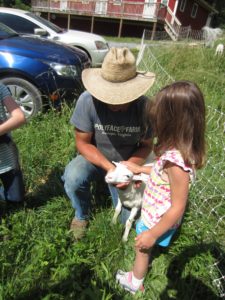
When it was time for my family to leave Polyface Farm and head home, we left with many memories, a camera loaded with pictures, a couple of t-shirts from the farm store, and a cooler packed with chicken, bacon, hamburgers, and hot dogs from the farm.
Polyface Farm has an open door policy allowing any interested visitors to drop in and see the farm in operation just about any time. If you’re ever in the area, you are welcome and it is well worth seeing. Be sure to bring a cooler to purchase and take home goodies.
In the coming years, we may eventually get around to visiting some of the more touristy spots in Virginia and the surrounding region, but this time around, the farm was the perfect destination.
Let’s connect on social media:
Mumbling Mommy on Facebook
Mumbling Mommy on Instagram
Mumbling Mommy on Pinterest
Mumbling Mommy on Twitter
Category: Family Free Time
Tags: farm








